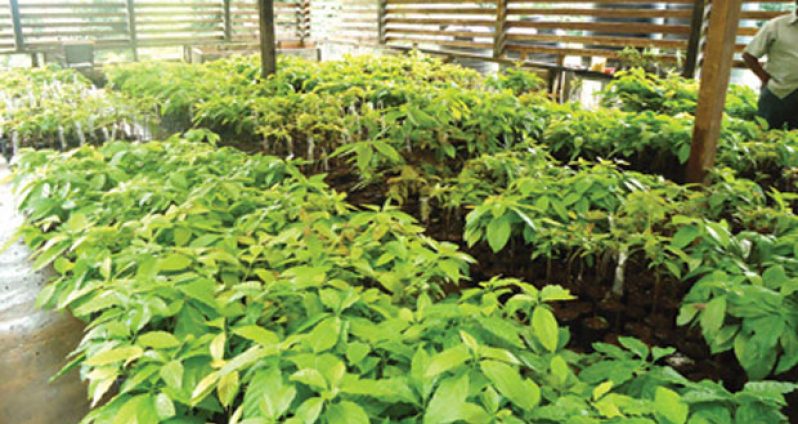NOT much is known about entrepreneurs in the hinterland regions, but the Blue Flame Women’s Group has been making waves in creating a name for itself as a reputable agro-processor; and, of late, has made an export to a well-known British chocolate factory.
Comprising 10 enterprising women, the group, located in Region One (Barima-Waini), produces mainly cocoa sticks, cassava bread, cassareep and coconut oil, along with seasonal products such as fruits and ground coffee. Its attractively packaged products are supplied under the North West Organics label as well as its own label — Hosororo Naturals, to super markets in Georgetown and other parts of the country.

With some five years in the business, founding member Christine James, who is also a founding member of the Women’s Agro-Processors Development Network (WADN), said Blue Flame has been keeping alight the torch of women entrepreneurship in Region One.
She told the Guyana Chronicle that the business has been moving from strength to strength, and has recently secured a small contract with UK chocolate manufacturing company Lessiter.
Now in its 99th year, the Lessiter chocolatiers have been hand-making, original chocolate since 1911.
According to the company’s website, Mr Lessiter had originally developed the business from a cluster of chocolate shops in pre-war London, and had expanded to satisfy a never-ending demand for fine couverture.
At the heart of the business today are brothers Peter and Hans Luder, both Swiss-born and highly trained chocolatiers. The company has said that the brothers have devoted almost half a century to refining and perfecting their chocolate skills, which they are now passing on to a second generation.
The company’s products range from nutty pralines to creamy champagne truffles, and its chocolate gifts are perfect for birth or other anniversaries, Christmas, or just a treat for one’s self.
BIG HOPES
Ms James said the UK market was secured after the company gave the green light to samples sent to it for testing. The Blue Flame Women’s Group is exporting to Lessiter some 200kg of cocoa mass as a start, and is hoping that the trade would expand in the coming years.
According to James, the women’s group has not been able to develop a label for the cocoa mass being exported to the UK. She pointed out that the commodity has been packaged in 20 kg buckets and posted to the importer. But she said that, with the help of WADN, this issue will be addressed.
WADN
Established in 2011, WADN consists of 11 women’s groups involved in agro-processing, having been drawn from Regions One, Two, Six and Nine.

The groups produce a variety of products, including cassava farine, cassava bread, peanut butter, vegetable and fruit-based sauces, achars, coconut oil, bottled water, cocoa sticks and soaps.
Prior to establishment of WADN, the groups operated as individual entities, independent of each other, and in some cases unknowing to each other, given the geography of Guyana.
However, as part of a Making Markets Work Programme, it was recognised that greater efficiencies and synergies could be realised by bringing these groups together, since they all share similar objectives, challenges and operational issues.
WADN is registered under the Friendly Societies Act, and its objectives include developing market linkages locally and abroad, and building capacity of member groups.
BLUE FLAME
The Blue Flame women’s Group is a story of women entrepreneurs making strides in a far flung region, moving from making cocoa products in their homes for sale to marshalling a cause for the establishment of a processing factory.
The factory, the lifeline of the women, was set up through funding from the Canadian Agency for International Development (CIDA) and the Guyana Turtle Conservation Society.
The equipment to make the factory operational was purchased through monies raised by residents and from the Presidential Grant, James said.
COMMUNITY-BASED OPERATION
She noted that the operation is community-based. The women’s group purchases cocoa from farmers in the community, which is processed at the factory to make various products, which are packaged and sold in supermarkets throughout the country.
The factory has a capacity to process some 6,000 pounds of cocoa beans per year, and according to the small entrepreneur, the group has been doing well, but the sky is its limit.
The group recently received a computer through the Rural Enterprise Agricultural Development (READ) Project, to network and share vital information on market access and product development, and to maxamise its growth and development.

Through READ, poor rural households in six of the 10 administrative regions are benefiting from better access to financial services and training in marketing and enterprise development – all of which is designed to enable them to overcome poverty.
EMPOWERING VULNERABLE GROUPS
The overall goal of the project is to improve the social and economic conditions of these households, particularly for small-scale producers and vulnerable groups comprised of women and indigenous peoples.
Implemented by the Ministry of Agriculture, the project is supported by both loan and grant financing from the International Fund for Agriculture Development (IFAD).
An estimated 20,800 people, almost half of them women, benefit directly from project activities.
READ targets farmers who grow non-traditional crops and have up to five acres under cultivation, and operators of microenterprises and small-scale businesses employing up to five permanent workers.
It also focuses on rural households that are headed by women, households that include unemployed or underemployed young people, and Amerindian communities.
President Donald Ramotar had said that for the economy to continue growing, small businesses have an important role to play. He pointed out that many operations started small before becoming big enterprises.
“It has been noted all over the world that while big businesses and major investments are extremely important — and as we continue to seek these types of investments in our economy, these are a very important pull-factor to help economies develop — but I think it has been noted by many experts in the field that the sustainability of economic development and progress in any society is directly linked to the development of small and medium-scale enterprises within the society,” he said.
According to the Entrepreneur Magazine, there are between 25 and 27 million small businesses in the U.S. that account for 60 to 80 per cent of all U.S. jobs.
By Tajeram Mohabir




.jpg)








